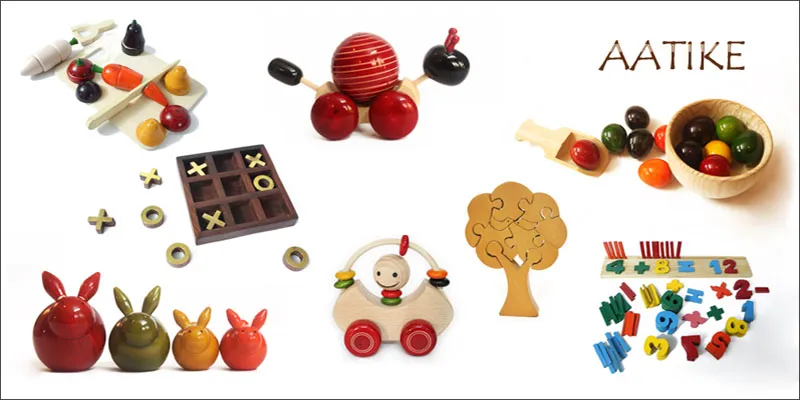Sowmya Krishnamurthy's journey from OnMobile to manufacturing wooden toys at Aatike

Sowmya Krishnamurthy was born and brought up in Bangalore. After getting her MBA, she spent 15 years in a marketing and product management role in the wireless and telecommunications sector working for companies like OnMobile, MobiApps and FirstApex. But while approaching mid-career, she found something missing and wanted to do more. It was during this time that her global business trips sparked an idea.
She decided to set-up a company that designs, manufactures and markets non-toxic wooden toys. Her venture would employ rural artisans, thereby boosting the local economy and give the ailing cottage industry a new lease of life. The idea stoked Sowmya’s inherent entrepreneurial spirit and she slowly started to shape her vision into a structured business model. After partnering with a Belgium based company, she launched Woodixtoys in 2011. Subsequently, she launched her flagship brand Aatike (playthings in Kannada) in India, and other international markets.
Starting Aatike:
Sowmya lists three reasons for deciding to venture into the traditional cottage industry space. “Firstly, easy availability of skilled labourers in rural areas who made a living through self-employment did not require a large capital outlay. Secondly, creating products that are relevant today by basing it on the rich history and craftsmanship of wooden toys, which are non-toxic and made from sustainable materials. And finally, to explore new business opportunities that have significant social impact and contribute to the cottage industry in a sustainable manner.”
Aatike designs, develops and sells products under the toys, home and office décor categories. Natural colours, textures, shapes and traditions and folklores of India inspire these products. They are handcrafted by various artisans across the country, including regions like Channapatna, Etikoppaka and Saharanpur. Aatike products are designed to enhance a children’s learning (skill development like motor, cognition, mathematical and social), with emphasis on safety (CE certified) and most importantly to be fun. Products are currently sold online through various retail channels and corporates in India & Europe. Aatike has a full-fledged warehouse set up in Bangalore to manage the distribution.
Aatike currently support 80 plus SKUs (stock keeping units) and adds about three to five new products every quarter. “We are also working at new range of products that cater to new categories besides toys, home & office decors. It is in the prototype phase now. We are quite excited about it and feel these products will have a global reach and success,” adds Sowmya.

Protecting, promoting and empowering India’s artisan community:India is home to approximately 23 million home-based artisans who depend on art and craft for a living, making this industry the second best provider of employment after agriculture. Even though these cottage industries don’t require a large capital outlay, they have been going through a crisis. In case of wooden toys, the cheap Chinese toys that have flooded Indian markets have been systematically robbing rural artisans of their livelihood.
“The idea of starting AATIKE is to develop a sustainable business model around the unique skills that is available here before it dies down due to lack of opportunities. Artisans are extremely happy to get regular business that showcases the skills acquired inherently by them by virtue of their ancestry. Whenever their products are showcased to a large audience, it brings great pride to them. When people buy the products they have developed and get repeat orders, it creates a huge positive impact to retain their skills and run their business. This automatically aids to economic growth in the cottage industries,” observes Sowmya.
AATIKE works with artisans by giving them the design and order. Artisans quote the price based on the raw materials and time taken to build the products. “These days even artisans are tech savvy and aware of the prices that their products fetch through online portals. They do their research and quote their price accordingly. As a matter of principle, AATIKE does not bargain with the artisans” adds Sowmya.
Response to Aatike products, and a story of a satisfied customer:
Thus far, AAIKE has received a positive response. In just over a year of operations, they have sold more than two thousand and five hundred handmade products, with less than 1 per cent returns, and created a livelihood for more than 15 artisans. On the sales and distribution front, they have partnered with many online bigwigs like Fabfurnish, Flipkart and Snapdeal. They have launched their retail presence in Bangalore, in partnership with international players like The Little Indian Company (UK) and Infanion (Belgium), and have built an impressive corporate clientele (Mahindra Retail & Merck Group).
So, has quitting a lucrative job at OnMobile been worth it? Sowmya recounts this tale to explain why she’s content with what she’s doing now.
“This happened at Soul Sante (a weekend marketplace) in Bangalore. A mother walked into our stall with a Rolex on her wrist and Louis Vuitton on her shoulder with her four year old son who was wearing branded clothes. The boy was fixated on a wooden dinosaur and refused to leave without it. Once he started nagging his mother, the tantrums started. She tried her best to use bribery, blackmail, and fired her final salvo by making her son brand conscious. But he simply refused to budge. The mother had no choice but buy the toy.
A few months later the mother and son came back again to attend the next Soul Sante, and this time, there was no fight between the mother and boy. The boy bought more our stuff. During the third visit, he brought his friends along too.
This delighted us. The mother now gives valuable input for improvements and the boy says he’s addicted to our toys. What can we say? A fan following is definitely most welcome.”
Lessons from corporate life and challenges with setting up Aatike:
Corporate life has taught Sowmya all the nitty-gritties of running a business, getting an understanding of the market and how to sell customer centric products. She describes it as a parent-child relationship, where she learned everything and no has moved on to become independent.
Along her journey she has faced considerable challenges. These include quality artisans leaving their jobs in droves to take up other forms of employment due to lack of earning opportunities in the cottage industries, lack of availability of raw materials from sustainable sources, influx of cheaper Chinese toys, customer’s mind-set that since these toys are from Channapatna they must be cheap, dealing with the unorganised sector where there are no standard performance measurement index and production processes for large scale quality output and the long turnaround time.
But Sowmya is persistent. Her vision is simple, but unstinting: “Build a sustainable and successful business model for high quality handmade products from India. Showcase these products across the globe which in-turn contribute back to our economy and encourages millions of homerun entrepreneurs from rural India.”







